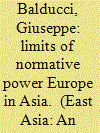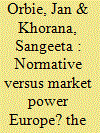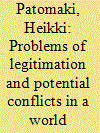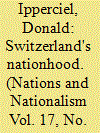|
|
|
Sort Order |
|
|
|
Items / Page
|
|
|
|
|
|
|
| Srl | Item |
| 1 |
ID:
184665


|
|
|
|
|
| Summary/Abstract |
Like other normative systems, the international nuclear export control norms are incomplete and at times contradictory. Thus, contestations to the international nuclear export control norms inevitably emerge, as they did in the wake of the 1974 Indian nuclear test and the 1991 discovery of Iraq’s nuclear weapons program. These two nuclear crises prompted intense debates regarding the adequacy of the existing norms. The outcome of the debates generated overwhelming agreement and action among nuclear suppliers that they required strengthening. Drawing on Wayne Sandholtz’s theory of normative change, which argues that events trigger disputes whose outcomes modify norms, this article illustrates how the nuclear export control norms have evolved in a cyclical fashion. The article aims to contribute to the constructivist literature on normative change and discusses policy implications.
|
|
|
|
|
|
|
|
|
|
|
|
|
|
|
|
| 2 |
ID:
093891


|
|
|
|
|
| Publication |
2010.
|
| Summary/Abstract |
In recent years an increasing number of works on EU international actorness have begun to focus on notions of "normative, value-driven external policy". However, the majority of these works tend to uncritically analyse EU foreign policy without considering its internal complexity and the existing national, supranational and intergovernmental dynamics. This paper first sheds light on these issues by proposing an original theoretical and analytical framework to study European, rather than merely EU, normative foreign policy. Secondly, this paper attempts to empirically apply such a framework in the specific case of European human rights promotion in China. What emerges is that in the case of China, and Asia more broadly, Europe appears more as a normative trap, where the interaction of EU institutions and member states originate policies not in line with the EU human rights normative basis.
|
|
|
|
|
|
|
|
|
|
|
|
|
|
|
|
| 3 |
ID:
144984


|
|
|
|
|
| Summary/Abstract |
The normative power Europe concept has greatly enriched the academic debate on what the EU is (should be), what it does (should do) and what impact it has (should have). However, various theoretical, methodological and empirical issues remain insufficiently addressed. This article will address two issues that have mostly been neglected: the perspective of the norm takers (in line with this special issue) and the market norms of the EU. The first section elaborates on these two issues, relying on recent advances in the literature and specifically the contributions by Damro (J Eur Publ Pol 19(5):682–699, 2012) and Rosamond (Brit J Polit Int Relat 16(1):133–148, 2013). Against this background, the second section examines the controversial EU trade negotiations with India. Specifically, this empirical part section focuses on how market liberal norms (government procurement) and cosmopolitan norms (human rights) are being promoted and received. We conclude that in the eyes of the EU, trade agreements could be a means to mitigate partners’ opposition and an eventual stepping stone for successful off-take of international social standards and multilateral procurement liberalization regulations by its partner countries. But, partner countries might not necessarily espouse the EU’s interest-led motivation and lend support to the EU’s desire to effuse multilateral norms through trading agreements. The case study on EU-India trade talks illustrates this, highlighting the divergence between the EU and Indian perspectives and demonstrates India’s lack of enthusiasm to adopt the EU’s preferred model for liberalization.
|
|
|
|
|
|
|
|
|
|
|
|
|
|
|
|
| 4 |
ID:
113733


|
|
|
|
|
| Publication |
2012.
|
| Summary/Abstract |
There are good security and political economy reasons for furthering integration towards a world political community (WPC), possibly assuming the form of a world state. However, would these reasons provide a legitimate and sustainable basis for the WPC? It is argued in this article that, while the standard security-military and functionalist political economy arguments for world unification may work to a certain point, they are insufficient and may become counterproductive. Especially if perceived in terms of rationally calculative orientation of action, they are not enough and may even work against the WPC. There must also be a belief in normative legitimacy, which may be anchored in universal principles such as popular democracy and human rights. In this light, theories of civilizing process and stages of ethico-political learning are explored. Collective human learning not only explains the quest for democratization but also points towards cosmopolitan ethico-political sentiments. However, there is an internal relationship between democracy and identity, and identities tend to be particular. The case is made, first, for thinking that the otherness of one's narrated 'self' can be located either in the past or, alternatively, in our contemporary being, when seen from a point of view of a possible future position in world history. Second, within a higher level identity-in-difference, a co-constitutive and mutually transformative relation between self and others can involve letting many differences just be.
|
|
|
|
|
|
|
|
|
|
|
|
|
|
|
|
| 5 |
ID:
107276


|
|
|
|
|
| Publication |
2011.
|
| Summary/Abstract |
In this article, I explore the subject of Switzerland's nationhood in light of a theoretical approach based on normative principles. This approach has the advantage of avoiding the definitional conundrum arising from the plurality of purely descriptive (often historical) definitions of nationhood. Instead, in accordance with certain normative inferences concerning what the nation ought to be given the principles of democracy, law and inclusion, it portrays the nation as a political entity having the largest possible group of individuals instituting a space of public discussion within a state. In this normative definition, attention should be drawn to the concept of 'space of public discussion', which, to my mind, entails the existence of a common public language used by its citizens - something notably different from either the multilingualism of the elite or a common parliamentary language. Proceeding in this way, I will defend the idea that Switzerland is a multinational state on the basis that cantons may be considered small nations, although certain pressures on the boundaries of the cantonal public spaces tending to expand them to the whole of the linguistic region must also be taken into
|
|
|
|
|
|
|
|
|
|
|
|
|
|
|
|
|
|
|
|
|